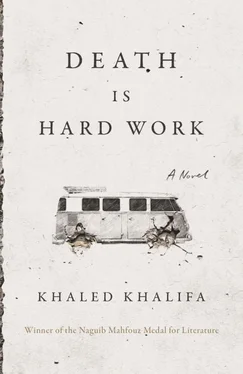When Hamada bid them goodbye, he warned them to watch out for extremist squadrons, insisting that Fatima cover her hair thoroughly. Hussein embraced him like a brother and wished him victory. The family only realized their mistake after they left the checkpoint, all three siblings thinking the same thing, but afraid to speak the words out loud: Why hadn’t they asked Hamada’s help in burying the body in the graveyard of his village? After the war was over, they could go back to collect the remains. But the ease of their last couple of crossings had given them confidence they had passed the worst. At last, they had reached the liberated areas, and their identity cards were no longer a problem; no one would look at them with contempt and suspicion for being born in S and having roots in Anabiya. Bolbol remembered his father’s rousing words: “The children of the revolution are everywhere.” They discussed Hamada and his cousin with amazement and sympathy in order to expel any negative feelings that might slip back into their souls thanks to the continuing stormy weather. They weren’t alone on the road anymore, or not so completely; at one point they were overtaken by a few modern SUVs scurrying along with fighters inside. One of these pulled alongside, and its occupants waved to Hussein to turn off his lights; they didn’t respond to his plea in return to be allowed to travel behind them, and after a hundred meters the vehicle turned onto a muddy side road. Without lights, then, the minibus seemed like a big coffin shared by Bolbol, Hussein, Fatima, and the body. The calmest of the four was the corpse, of course, which knew no fear or worry; blue tinged, it swelled with perfect equanimity and didn’t care that it might explode at any moment. When it vanished, at last, it would do so willingly, unconcerned with wars, soldiers, or checkpoints.
Bolbol thought about his mother. She hadn’t expected his father’s body to be buried beside her. She hadn’t even left enough space beside her grave for it.
She had often endured his unjustified rage. The image of them tending flowers in the garden in total harmony was a lie his mother had been forced to live for all forty years of their married life. When she was angry, she would mourn her lot in curt phrases. It took years of Bolbol’s hearing these tiny complaints before he came to understand the tragedy of her life: she was a maid to a man who had left his land and his family to invent an imaginary history for himself. She missed Anabiya and its meadows. She didn’t care about anything her husband did; she didn’t want to become a sophisticated woman. She adored the strong consonants of her country accent and kept silent whenever her husband started to tell his family history to visitors. Believing that he was being creative, not that he was simply a liar, she no longer bothered to correct him as to names and relationships. The only really interesting character Abdel Latif had known was his sister Layla, who had set herself on fire—but he never once mentioned her. She had been a close friend of Bolbol’s mother, who described her as a wonderful girl and recalled her kind heart and beautiful voice when she sang for her friends as they prepared okra, squash, and tomatoes on mild summer evenings. Layla had memorized every song, it seemed, and her zest for life made her popular among all the girls her age; they would gather at her father’s house, and she would teach them beauty regimens. She experienced an early heartbreak when she fell in love with her cousin, Lieutenant Colonel Jamil, who left her and married an idiotic fair-skinned girl from a powerful family rich in land. Bolbol’s aunt told her friends her beloved had essentially sold her, had given her up in exchange for an enormous dowry and powerful connections, but on the day he was executed, she tore her clothes and lamented as a wife would grieve her husband. She couldn’t endure the weight of her few memories of Jamil. She stepped up to the coffin, pushed aside the soldiers who surrounded it, wouldn’t let anyone near the traitor, and beat on the coffin lid, wanting to wake him as she used to do whenever she could steal a few moments to go to his room. She would shake him awake and stroke his face with her delicate hand, staring at him in a way he found irresistible. Her laughing eyes, her fresh scent, and her strange elegance among the fellahin made her seem like someone from a different era and place. She wasn’t shabby and second-rate, like the other women of the area.
Her open mourning for Lieutenant Colonel Jamil was a real scandal for the family. She had gone further than a girl of any respectable family was permitted to go. The men gawked at her, her father couldn’t hide his fury, and the women of the family took her home, locked her in her room, and returned to the funeral as if nothing had happened. Everyone waited for a verdict from her father and three brothers. All that happened, however, was that her father was silent for a month, then everything went back to normal. After all, Lieutenant Colonel Jamil deserved to have girls rending their garments in frenzied mourning on his account (or so the family, which had tasted power for the first time through his advantageous marriage, decided to believe). Six months after this incident, Layla’s father informed her that an appointment had been made to recite the Fatiha over Hamdan, after which she would have to marry him in a month’s time; she was to accompany the women of the family to Aleppo for the preparations in the meantime. Layla couldn’t accept this; she went to her father’s room and told him outright she would never marry Hamdan. Then she asked to speak with her brother Abdel Latif and told him that he had to intervene, adding that she wouldn’t be turned into a cow in the house of a man she didn’t love, and she wouldn’t live as her mother had lived. She didn’t know what form she wanted her life to take, but she was certain about what life she didn’t want. She knew her wishes were exceptional but was confident that her brother Abdel Latif wouldn’t throw her to the wolves of their family. They spoke for a long time, but he was afraid of being seen protecting and supporting her, which would have been a pointless battle in any case, especially after the scandal of her behavior at Lieutenant Colonel Jamil’s funeral. What Layla wanted was to distance herself from this land of ruin and finish her education; she was the only girl in the village who had even gotten through middle school—with the encouragement of her brother, who was now lying dead in a cold minibus on a distant road. Yes, she’d wanted a different life, the one she thought that she deserved. No one believed the threats she made; no one believed that she would really make them regret their decision. She told Bolbol’s mother she would become a blazing torch, burning her family and lighting the way for other women.
She used to love long words, just like Abdel Latif. She composed unusual sentences and could spend hours reciting poetry and criticizing the refinement of its composition. She was an inexhaustible mass of sensations. No one could believe their eyes when they saw her on her wedding night. She contented herself with being among her friends, including Bolbol’s mother, in the weeks leading up to the wedding; she wouldn’t allow any women from the groom’s family, or even her own, to help her. She celebrated her body: removed her body hair like the girls in the city did, and Bolbol’s mother rubbed her with creams. Then she put on her white dress, went up to the roof, and pulled up the stepladder behind her. She had prepared everything the day before: the bottle of kerosene and the matches. She looked down at the revelers in the courtyard, where the party was at its height, before she began to laugh, and set herself alight. Her body was extinguished amid the stupefaction of the men and the weeping of the women, who couldn’t believe they had lost their dear friend forever.
Читать дальше












